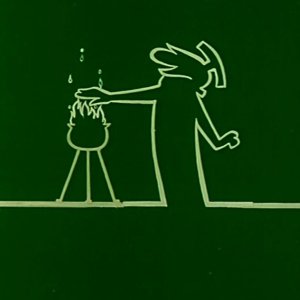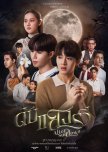Heteronormativity at its finest
Change the character of Rawee into a woman, and you'll get an old-fashioned, tropey romance movie with a supernatural side.
Why?
Rawee is the typical young orphan, who is brought into the house of a new family, first of unclear status, then gets engaged to/married off to the family`s son.
Rawee stays at home and makes desserts for the family, while Phloeng is outside, doing business things. Rawee is easily hurt, and the manly Phloeng carries her, sorry, him, because Rawee obviously can't walk on his own after scraping a knee. Phloeng is the one who gets jealous and overall is the one who pushes their relationship to the next levels.
Apart from one remark at the beginning, Rawee's gender has no relevance at all.
There's really no point in Rawee being a man. (Because the character isn't, it's just a male body in a female role.)
(Edit to add: And it's a stereotypically "weak" female role, at that. I like women to have more agency, and Rawee basically has none.)
The side couple really had no relevance to the story (at first I thought maybe the ghost would use it, but no.) and could have been left out. Instead the time could have been used to tell the ghost's story in more detail.
The acting was all right, good by the seasoned actors. Cinematography was fine, music non-remarkable.
Sets were appropriate for the early 1960s, as far as I can tell. I'm not too sure about the clothing -- in Europe no man would have just casually worn a T-Shirt, and short trousers for a young men of 21 years would have been a no-go. but I'm not familiar with Thailand's fashion in the 1950s and 1960s, so they might be okay.
Well, at least now I can point to another movie whenever I want to show what I mean when I talk about heteronormativity in BL dramas and movies.
Why?
Rawee is the typical young orphan, who is brought into the house of a new family, first of unclear status, then gets engaged to/married off to the family`s son.
Rawee stays at home and makes desserts for the family, while Phloeng is outside, doing business things. Rawee is easily hurt, and the manly Phloeng carries her, sorry, him, because Rawee obviously can't walk on his own after scraping a knee. Phloeng is the one who gets jealous and overall is the one who pushes their relationship to the next levels.
Apart from one remark at the beginning, Rawee's gender has no relevance at all.
There's really no point in Rawee being a man. (Because the character isn't, it's just a male body in a female role.)
(Edit to add: And it's a stereotypically "weak" female role, at that. I like women to have more agency, and Rawee basically has none.)
The side couple really had no relevance to the story (at first I thought maybe the ghost would use it, but no.) and could have been left out. Instead the time could have been used to tell the ghost's story in more detail.
The acting was all right, good by the seasoned actors. Cinematography was fine, music non-remarkable.
Sets were appropriate for the early 1960s, as far as I can tell. I'm not too sure about the clothing -- in Europe no man would have just casually worn a T-Shirt, and short trousers for a young men of 21 years would have been a no-go. but I'm not familiar with Thailand's fashion in the 1950s and 1960s, so they might be okay.
Well, at least now I can point to another movie whenever I want to show what I mean when I talk about heteronormativity in BL dramas and movies.
Was this review helpful to you?


 4
4














